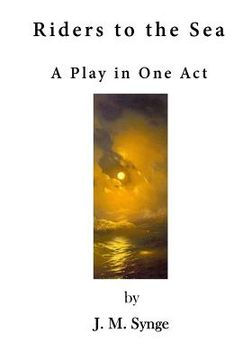Synopsis "Riders to the Sea: A Play in One Act (in English)"
Riders to the SeaA Play in One ActBy J. M. SyngeRiders to the Sea is a play written by Irish Literary Renaissance playwright John Millington Synge. It was first performed on 25 February 1904 at the Molesworth Hall, Dublin, by the Irish National Theater Society. A one-act tragedy, the play is set in the Aran Island, Inishmaan, and like all of Synge's plays it is noted for capturing the poetic dialogue of rural Ireland. The plot is based not on the traditional conflict of human wills but on the hopeless struggle of a people against the impersonal but relentless cruelty of the sea.It must have been on Synge's second visit to the Aran Islands that he had the experience out of which was wrought what many believe to be his greatest play. The scene of "Riders to the Sea" is laid in a cottage on Inishmaan, the middle and most interesting island of the Aran group. While Synge was on Inishmaan, the story came to him of a man whose body had been washed up on the far away coast of Donegal, and who, by reason of certain peculiarities of dress, was suspected to be from the island. In due course, he was recognised as a native of Inishmaan, in exactly the manner described in the play, and perhaps one of the most poignantly vivid passages in Synge's book on "The Aran Islands" relates the incident of his burial.The other element in the story which Synge introduces into the play is equally true. Many tales of "second sight" are to be heard among Celtic races. In fact, they are so common as to arouse little or no wonder in the minds of the people. It is just such a tale, which there seems no valid reason for doubting, that Synge heard, and that gave the title, "Riders to the Sea," to his play.It is the dramatist's high distinction that he has simply taken the materials which lay ready to his hand, and by the power of sympathy woven them, with little modification, into a tragedy which, for dramatic irony and noble pity, has no equal among its contemporaries. Great tragedy, it is frequently claimed with some show of justice, has perforce departed with the advance of modern life and its complicated tangle of interests and creature comforts. A highly developed civilisation, with its attendant specialisation of culture, tends ever to lose sight of those elemental forces, those primal emotions, naked to wind and sky, which are the stuff from which great drama is wrought by the artist, but which, as it would seem, are rapidly departing from us. It is only in the far places, where solitary communion may be had with the elements, that this dynamic life is still to be found continuously, and it is accordingly thither that the dramatist, who would deal with spiritual life disengaged from the environment of an intellectual maze, must go for that experience which will beget in him inspiration for his art. The Aran Islands from which Synge gained his inspiration are rapidly losing that sense of isolation and self-dependence, which has hitherto been their rare distinction, and which furnished the motivation for Synge's masterpiece. Whether or not Synge finds a successor, it is none the less true that in English dramatic literature "Riders to the Sea" has an historic value which it would be difficult to over-estimate in its accomplishment and its possibilities. A writer in The Manchester Guardian shortly after Synge's death phrased it rightly when he wrote that it is "the tragic masterpiece of our language in our time; wherever it has been played in Europe from Galway to Prague, it has made the word tragedy mean something more profoundly stirring and cleansing to the spirit than it did."

